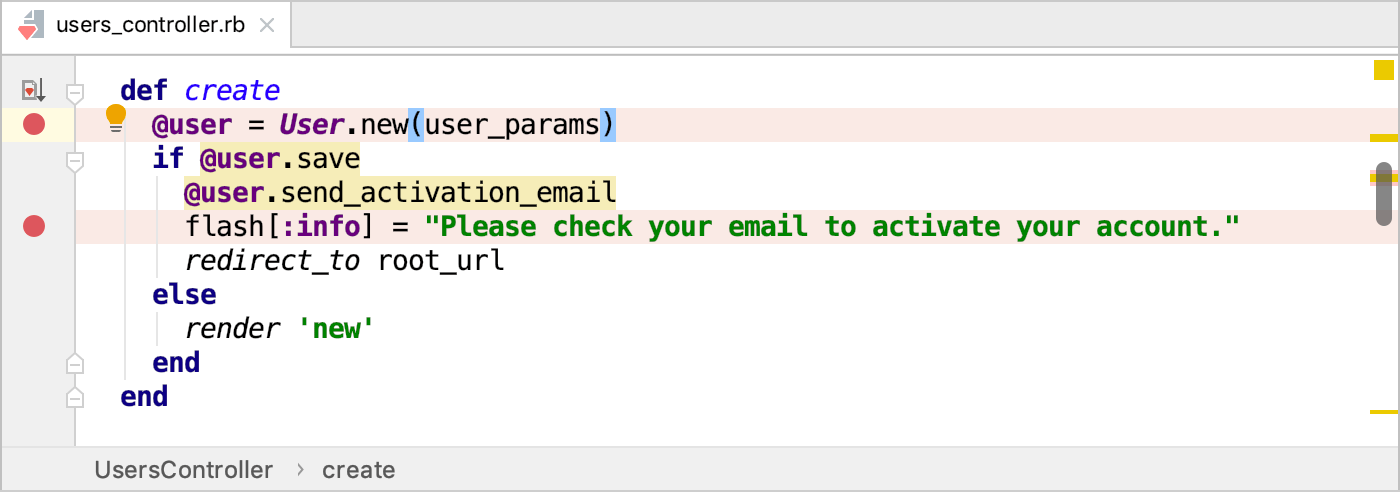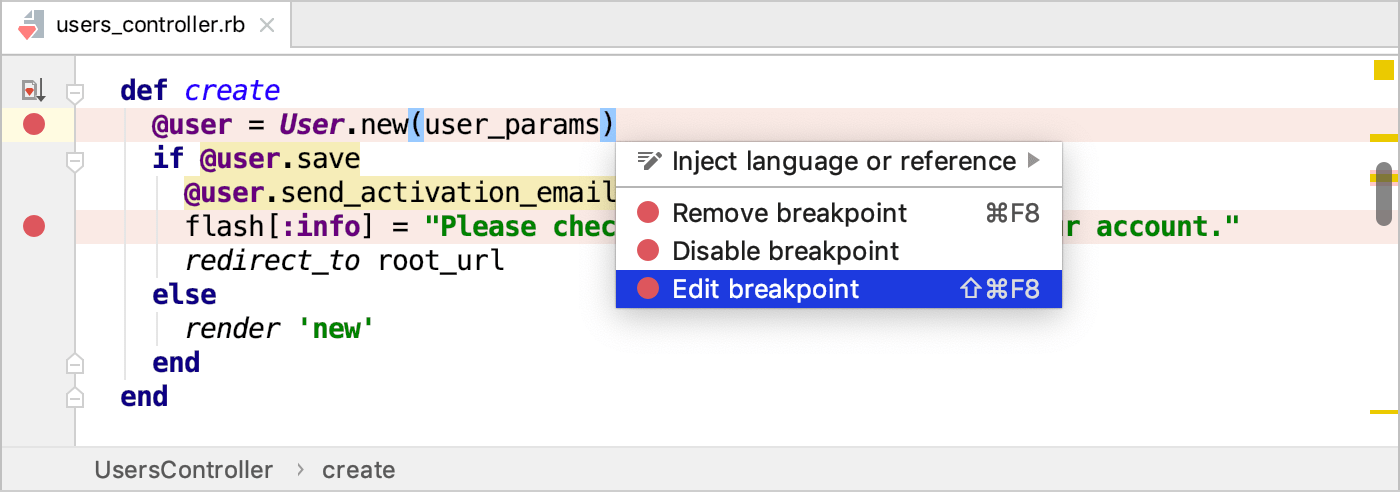Breakpoints
Breakpoints are source code markers that let you suspend program execution at a specific point and examine its behavior.

Once set, a breakpoint remains in your project until you remove it explicitly (except for temporary line breakpoints).
If a file with breakpoints was modified externally, for example, updated through a VCS or changed in an external editor, and the line numbers have changed, breakpoints will be moved accordingly. Note that RubyMine must be running when such changes are made, otherwise they will pass unnoticed.
Line breakpoints
Line breakpoints can be set on executable lines of code. Thread execution is suspended before the line with such breakpoint, and RubyMine displays the stack frames on that thread's stack.
Set a line breakpoint
Place the caret at an executable line of code where you want to gutterpoint and click the gutter next to that line or press Ctrl+F8.
To set a temporary line breakpoint, press Ctrl+Alt+Shift+F8. The breakpoint will be removed from your project right after it is hit.
Remove a line breakpoint
Click the breakpoint icon in the gutter.
To avoid accidentally removing a breakpoint and losing its parameters, you can choose to remove breakpoints by dragging them to the editor, or by clicking the middle mouse button: open the Settings/Preferences dialog Ctrl+Alt+S, go to , and select Drag to the editor or click with middle mouse button. Clicking a breakpoint will then toggle its state (enabled/disabled).
Exception breakpoints
Exception breakpoints are triggered when the specified exception is thrown. They apply globally to the exception condition and do not require a particular source code reference.
Set an exception breakpoint
Press Ctrl+Shift+F8 or select from the main menu.
In the Breakpoints dialog, press Alt+Insert or click
, and select Ruby Exception Breakpoint or
In the Enter Exception Class dialog, specify an exception class from a library or from your project.
Remove an exception breakpoint
Press Ctrl+Shift+F8 or select from the main menu.
In the Breakpoints dialog, select the breakpoint you want to delete and click
or press Alt+Delete.
Breakpoints properties
Depending on the type of a breakpoint, you can configure the following additional breakpoint properties:
Actions to be performed when the breakpoint is hit
A suspend policy that defines whether the application must be suspended when the breakpoint is hit
Dependencies on other breakpoints
Conditions that define when the breakpoint must be hit
To edit the properties of a breakpoint, press Ctrl+Shift+F8, or right-click the breakpoint in the editor gutter.
| Option | Description |
|---|---|
| Enabled | Clear the checkbox to temporarily disable a breakpoint without removing it from the project. Disabled breakpoints will be skipped during the debugging process. |
| Suspend | Select the checkbox to pause the program execution when a breakpoint is hit. Suspending an application is useful if you need to obtain logging information or calculate an expression at a certain point without interrupting the program. If you need to create a master breakpoint that will trigger dependent breakpoints when hit, choose not to suspend the program at that breakpoint. Choose the suspend policy:
|
| Condition | Select to specify a condition for hitting a breakpoint. A condition is a Ruby Boolean expression evaluating to This expression must be valid at the line where the breakpoint is set, and it is evaluated each time the breakpoint is hit. If the evaluation result is You can enter multi-line expressions, for example:
@user.name == "Example User" ||
@user.email == "example@jetbrains.com"
|
| Log | Select if you want to log the following events to the console:
|
| Evaluate and log | Select to evaluate an expression when the breakpoint is hit, and show the result in the console output. |
| Remove once hit | Select to remove the breakpoint from your project right after it has been hit. |
| Disable until breakpoint is hit | Select the breakpoint that will trigger the current breakpoint. Until that breakpoint is hit, the current breakpoint will be disabled. You can also select if you wish to disable it again or leave it enabled once it has been hit. |
Productivity tips
- Quick access to most common settings
Right-click a breakpoint in the editor gutter to quickly disable or suspend it, or set a condition.
- Breakpoints intentions
You can get access to the most common breakpoint actions and filters through intention actions(Alt+Enter).

When a breakpoint is hit, more intention actions are available.
- Group breakpoints
You can organize breakpoints into groups, for example, if you need to mark out breakpoints for a specific problem.
In the Breakpoints dialog Ctrl+Shift+F8, select a breakpoint you want to place in a group and choose from the context menu.
- Move breakpoints
To move a line breakpoint, drag it to the target line.
- Copy breakpoints
To copy a breakpoint, press Ctrl and drag it to the target line.
- Disable breakpoints
To temporarily disable a breakpoint without removing it from the project, hold down the Alt key and click the breakpoint icon in gutter.
- Quick search
If you have many breakpoints in your project, you can add short descriptions to them to search for them easily: right-click a breakpoint in the Breakpoints dialog Ctrl+Shift+F8 and select Edit description from the context menu. Now when you start typing a breakpoint's name, it gets the focus.
- Jump to source
To jump from the Breakpoints dialog to the line of code where the selected breakpoint is set, press F4.